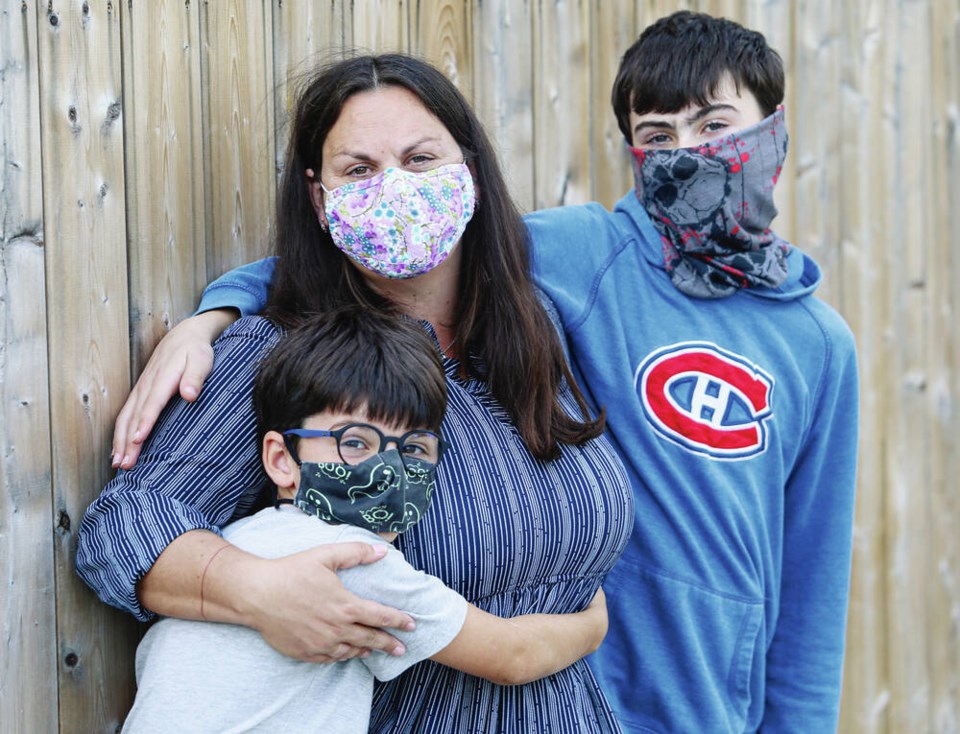Students from kindergarten to Grade 12 will be required to wear masks in classrooms and school buses starting Monday to protect against COVID-19.
Previously, masks were only required for students from Grades 4 to 12, along with all school staff.
Provincial health officer Dr. Bonnie Henry said Friday the order will be in place until at least January “as one additional layer to help reduce risk of transmission in classrooms and in schools.” There are exemptions and accommodations for adults and children who have challenges wearing masks, but not for those who don’t believe in wearing masks, Henry said.
Henry and Education Minister Jennifer Whiteside have faced mounting pressure from parents and the B.C. Teachers’ Federation to do more to both reduce COVID-19 transmission in schools and to report possible exposures.
School districts in Vancouver, Surrey and Burnaby previously instituted their own mask mandates for the younger grades.
Angela Carmichael, president of the Victoria Federation of Parent Advisory Councils, said trustees had been planning a motion for a regional mask mandate in Greater Victoria before Friday’s announcement.
While she’s pleased with the new health order, she said she’s frustrated that it took so long. “Because the teachers had asked for it, they’d asked for it last year, and we know the science behind the mask.”
Carmichael said her son in Grade 3 has been wearing his mask since school started even though it wasn’t required. While it fogs his reading glasses and frustrates him, “we are still enforcing him to wear it.”
Henry said schools remain the safest place for children to be, especially since the arrival of highly effective vaccines. But, she conceded: “We’re facing a more infectious strain of virus this year.”
The expanded mask mandate follows a rapid increase in COVID-19 cases, particularly in the past two weeks, in children ages five through 11. Although most are mild, the number of cases in children rose to 30 per 100,000 in September, up from fewer than five per 100,000 in August.
There is not yet a COVID-19 vaccine for children under 12, though Henry hopes the lower-dose fridge-stable Pfizer vaccine will be available to younger children before the end of the year.
The children’s version will contain 10 micrograms rather than the 30 micrograms adults receive.
The provincial health officer said infections in children continue to come mostly from adults who have not been immunized. “The majority of COVID transmission continues to occur in homes and through social networks and we’ve seen that throughout this pandemic,” said Henry. “Nevertheless, increased diagnoses has led to increasing numbers of potential exposure events, and several school outbreaks have also been detected and reported.”
At the same time, cold and flu-like viruses have begun circulating and masks will help prevent those transmissions, she said.
As part of COVID-19 testing, public health has been ramping up to test for multiple viruses at once, Henry said, including the respiratory syncytial virus, or RSV, which can lead to hospitalization for young children, and para-influenzas, and influenza.
Winona Waldron, president of the Greater Victoria Teachers’ Association, applauded the expanded mask mandate, but would like to see more infection-control measures, such as smaller cohorts of students, staggered school start times and a hybrid of online and in-class learning. “That would go a long way to reduce the density of schools, specifically at the elementary level.”
Henry said smaller cohorts haven’t been shown to prevent transmission and caused “significant challenges in operations of schools at all levels” last school year.
Other measures taken by schools, such as reducing the mixing of grades and reducing group gatherings such as assemblies, “are having the effect that we want, which is to prevent transmission between large groups in the school setting and not impeding the operations,” Henry said.
Whiteside said the province has invested $87.5 million over the past two years to ensure districts can maintain and upgrade their heating, ventilation and air-conditioning systems.
Henry said she expects teachers to get vaccinated, but has not mandated immunizations for this group, even though the B.C. Teachers’ Federation has said it would not object.
On Friday, 18 Vancouver Island schools — including seven in Greater Victoria — were on Island Health’s list of outbreaks or clusters of COVID-19 in schools, up from 10 at the start of the week.
ceharnett@timescolonist.com



